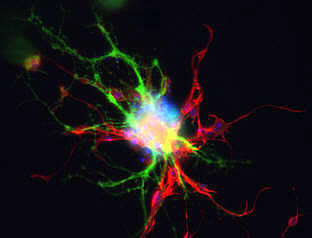The unifying mission of the Structural and Molecular Cell Biology research area is to understand fundamental mechanisms of biology underpinning health.
 Our research
Our research
To achieve this overarching aim, our research encompasses a wide range of research objectives: from the unraveling of molecular mechanisms of gene regulation and expression, through to their influence on metabolism and the molecular pharmacology of receptors, and from the molecular pathways of cell-to-cell communication, vesicle trafficking and intracellular cell signaling, to the cellular mechanisms of cell migration, proliferation, cell survival, cell death, neural circuit formation and modification, that collectively drive and maintain organismal development, homeostasis and behaviour.
We aim to understand how these processes take place normally in development and in health, and how alterations underlie human disease and ageing, with a particular emphasis in, cardiovascular disease, cancer (particularly leukaemia and lymphoma), endochrinology, injury and trauma, regeneration and repair. Understanding these fundamental underpinning processes is essential to finding therapeutic interventions to cell damage, injury and disease states.
Our researchers
Collectively, our researchers are expert molecular cell biologists, bioinformaticians, chemists, biochemists, cell biologists, developmental biologists, geneticists, neurobiologists, and structural biologists. A multidisciplinary approach combines a wide variety of cutting-edge techniques including: next generation sequencing, CRISPR technology, bioinformatics and genomics, genetics, proteomics and mass spectrometry, metabolomics and mass spectrometry, structural biology, computational biology and systems biology, laser scanning confocal microscopy and imaging in fixed specimens, in time lapse and with super-resolution, transmission electron microscopy, optogenetics, electrophysiology, and behavioural assays. We work in vitro, in cell culture and in vivo, using stem cells and model organisms like yeast S. pombe, the fruit-fly Drosophila and mice, as well as human-based studies.
Our research interests include RNA biology from nonsense mediated decay and nuclear protein translation, to gene splicing and non-coding RNAs; cell communication and signaling, including signaling at the membrane by tyrosine kinase receptors (e.g. FGFR), serine/threonine kinase receptors (e.g. TGFb /ActivinA receptors), tetraspanins, G-Protein Coupled Receptors and peptide ligands, Toll-family receptors and neurotrophin ligands; the endocytic pathway in receptor signaling during pluripotentcy and differentiation in human stem cells; downstream signaling pathways regulating the actin cytoskeleton (e.g. Rho GTPases), phosphorylation, Ca2+ signaling, autophagy, apoptosis and proliferation; transcription factors that regulate these events and their regulatory gene networks; metabolism in healthy ageing and in inflammatory, immunological and hormone-based changes during the lifecourse; neural circuitry.
Altogether, these mechanisms regulate cell number, cell shape, cell size, and how cells interact with each other, in eukaryotic cells, from the simpler yeast to stem cells and to neurons, in development, in the brain, in health, in regeneration and in disease.